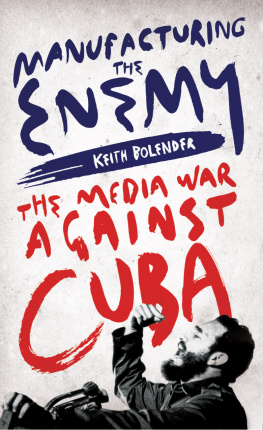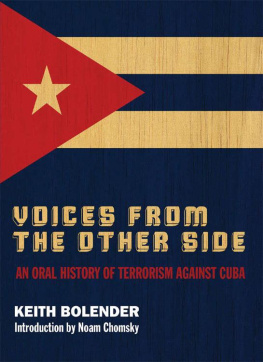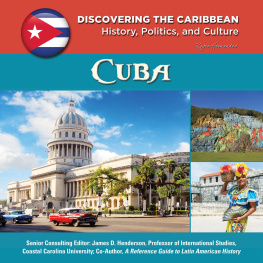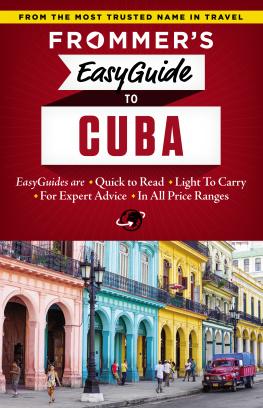Keith Bolender - Manufacturing the enemy : the media war against Cuba
Here you can read online Keith Bolender - Manufacturing the enemy : the media war against Cuba full text of the book (entire story) in english for free. Download pdf and epub, get meaning, cover and reviews about this ebook. year: 2019, genre: Politics. Description of the work, (preface) as well as reviews are available. Best literature library LitArk.com created for fans of good reading and offers a wide selection of genres:
Romance novel
Science fiction
Adventure
Detective
Science
History
Home and family
Prose
Art
Politics
Computer
Non-fiction
Religion
Business
Children
Humor
Choose a favorite category and find really read worthwhile books. Enjoy immersion in the world of imagination, feel the emotions of the characters or learn something new for yourself, make an fascinating discovery.
- Book:Manufacturing the enemy : the media war against Cuba
- Author:
- Genre:
- Year:2019
- Rating:3 / 5
- Favourites:Add to favourites
- Your mark:
- 60
- 1
- 2
- 3
- 4
- 5
Manufacturing the enemy : the media war against Cuba: summary, description and annotation
We offer to read an annotation, description, summary or preface (depends on what the author of the book "Manufacturing the enemy : the media war against Cuba" wrote himself). If you haven't found the necessary information about the book — write in the comments, we will try to find it.
Manufacturing the enemy : the media war against Cuba — read online for free the complete book (whole text) full work
Below is the text of the book, divided by pages. System saving the place of the last page read, allows you to conveniently read the book "Manufacturing the enemy : the media war against Cuba" online for free, without having to search again every time where you left off. Put a bookmark, and you can go to the page where you finished reading at any time.
Font size:
Interval:
Bookmark:

By the same author
Voices From the Other Side;
An Oral History of Terrorism Against Cuba
Cuba Under Siege
The Media War Against Cuba
Keith Bolender

To Rose and Reg
Wish you were here
First published 2019 by Pluto Press
345 Archway Road, London N6 5AA
www.plutobooks.com
Copyright Keith Bolender 2019
The right of Keith Bolender to be identified as the author of this work has been asserted by him in accordance with the Copyright, Designs and Patents Act 1988.
British Library Cataloguing in Publication Data
A catalogue record for this book is available from the British Library
ISBN 978 0 7453 4028 9 Hardback
ISBN 978 0 7453 4026 5 Paperback
ISBN 978 1 7868 0568 3 PDF eBook
ISBN 978 1 7868 0570 6 Kindle eBook
ISBN 978 1 7868 0569 0 EPUB eBook
This book is printed on paper suitable for recycling and made from fully managed and sustained forest sources. Logging, pulping and manufacturing processes are expected to conform to the environmental standards of the country of origin.
Typeset by Stanford DTP Services, Northampton, England
Simultaneously printed in the United Kingdom and United States of America
A project such as this requires the assistance and support of a great many people. I would like to recognize those who have played an important part in the completion of this work. John Kirk for his immediate and consistent support, Noam Chomsky, Heriberto Nicolas, Karen Lee Wald, Raul Verrier, Fernando Gonzlez, Yamil and Sandra and everyone at ICAP have provided invaluable information and assistance. As well as everyone else in Cuba, who have offered their encouragement and expertise. A special thanks to all the Cuban Five for their time. Id like also to particularly thank Pluto Press for their interest and support, once again, of my work. Thanks to David Castle for his enthusiasm and Thrse Wassily Saba for her editorial expertise and improvements. To friends and family, a special appreciation. And of course without the patience and encouragement of Magalita, this could not be possible.
When Fidel Castro and his idealistic band of revolutionaries emerged triumphant in the early days of 1959, the United States soon determined that this nationalist movement could not be tolerated. American hegemony over Cuba, which they had maintained over the previous 60 years, was being threatened, and as Fidel Castro began implementing his new social/economic order, policies for regime change were implemented.
A variety of methods were unleashed to destroy the revolution. Isolation, restrictions preventing American citizens from traveling to Cuba, hundreds of acts of terrorism against civilian and commercial targets, an economic blockade with extra-territorial application, assassination attempts against Castro and other leadership figures, even an exile-led invasion were all utilized. In one form or the other, aspects of this siege against Cuba continue to this day.
One of the longest-standing expressions of this antagonism derives from an institution usually recognized as separate from the state in a modern liberal democracythat of an independent press. In fact, the mass media has enthusiastically endorsed the governments counter-revolutionary objectives to end Cubas socialist experiment and force the country to return into Americas embrace. The medias role has been foremost to propagandize the revolution in the most negative forms, resulting in the normalization of the demonization of the Cuban revolution and its supporters. Media has led the inexorable march toward creating a critical narrative that does not stand up to honest scrutiny.
Misinformation has been responsible for the preponderance of negative myths about Cuba. When myth replaces history, facts become immaterial to rational discussion. It is the means by which the worst charges against revolutionary society are believed and any attempt at authentic examination is denied. Corporate medias single-mindedness has been well served.
After an initial honeymoon period when the press was inclined to portray Castro and the revolutionaries in a relatively sympathetic form, in contrast to the universally loathed dictatorship of Fulgencio Batista, the tone turned dark. America had expected reform from Castro; instead, he gave them revolution. Once Fidel Castro started making good on his promiseswhich inevitably confronted American imperial intereststhere was little doubt how public opinion would be shifted. Less than a year after the triumph and ever since, the most influential national media outlets have attempted to frame the Cuban Revolution as an unmitigated failure, a social evil that had done nothing positive for the people. Every mistake has been amplified, every misstep condemned as proof of the inadequacies of the movement. Every success diminished or ignored, every gain criticized in a self-constructed comparison that continually holds Cuba up to a higher standard few other nations are subjected to.
According to the rhetorical trappings the mainstream media has utilized for the past 50 years, little benefit has emerged from the revolution, while all shortfalls are solely the responsibility of the systemrarely putting into context the impact Americas non-stop strategy of regime change has had on the island governments well-documented shortcomings. A self-imposed censorship has been applied so as not to disseminate essential information regarding this unrelenting hostility against Cuba, nor to provide background to Americas historic imperial designs. Remarkably, the lack of self-awareness of this reality often reaches top government spokespeople, including President Donald Trumps press secretary Sarah Huckabee Sanders, who claimed in 2018 that the United States does not, get to dictate how other countries operate. It might be worthwhile to let the Cubans in on that revelation.
Media developed its Cuba posture in obedience to Washingtons designation of the revolution as illegitimate. Once the ruling elites came out in bipartisan voice declaring Fidel Castro an enemy, the press went about slanting its coverage in conformity with foreign policy objectives. Destabilization, subversion and economic warfare have been the tools of regime change policy used by the US government; the media has willingly helped forge them. There was no effort to examine the revolution as a popular expression of true Cuban nationalism. The only explanation provided was one that alleged Fidel Castro was a master manipulator who had duped the Cuban people down the path to anti-Americanism, and then worse, communism. Consequently, politicians and media refused to understand the historical roots for revolution, as they could not admit it was United States hegemony over Cuba that formed much of its basis. The dictator Batista might have been the lightning rod, but the storm against neo-colonialism had been brewing long before. Fidel Castro was the tempest that swept it all away.
Taking up the anti-American label became standard coverage as relations between the two former friends worsened. When the revolution moved into the Soviet Union sphere, Little credited, much discredited.
A favorite ploy of the media is to offer expert opinions on how to fix the serious economic problems Cuba faces, while consistently ignoring Americas debilitating economic embargo. A number of national outlets reported on the Brookings Institutes comprehensive 2018 study on Cubas economy and the measures needed to improve it; the report not once mentioned the impact of US restrictions.
Font size:
Interval:
Bookmark:
Similar books «Manufacturing the enemy : the media war against Cuba»
Look at similar books to Manufacturing the enemy : the media war against Cuba. We have selected literature similar in name and meaning in the hope of providing readers with more options to find new, interesting, not yet read works.
Discussion, reviews of the book Manufacturing the enemy : the media war against Cuba and just readers' own opinions. Leave your comments, write what you think about the work, its meaning or the main characters. Specify what exactly you liked and what you didn't like, and why you think so.













